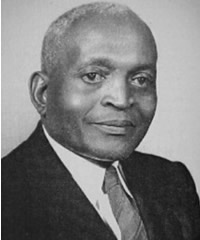
The prejudice that presented its ugly head in the lives of Southern people was not unique to those who were reprobates. As a learned tradition, it etched its way into the hearts of many family members who professed Christianity and who should have known better. I take some comfort, however, in the fact that their behaviors often conflicted with their spoken denouncements.
My Dad occasionally made racial remarks that were not becoming to his position as an educator and certainly not to his profession as a Christian minister. On the other hand, when someone had a need that Dad knew about, prejudice did not enter into his decision…he did whatever he could without hesitation.
In the forties and fifties, a black minister of the gospel won the hearts of many Christian people, and even though he has been dead for several years, his name and work are still alive. He succeeded in getting the support of several well known white brethren to help him establish a preacher training school for young men of his race, and Southern Bible Institute in Dallas, Texas continues to fulfill Marshall Keeble’s dream.
Once, Dad took the family to a neighboring town to hear Brother Keeble in a tent meeting. Brother Keeble, who was known for his use of humor in making important points, sometimes exploded a laugh through half-closed lips. My brother, who happened to be sitting on the front row that evening, declared that he saw a rainbow in the moisture that sprayed from Brother Keeble’s mouth during one of his witty outbursts!
Later, around 1953, my husband and I were privileged to take our small family to an outdoor meeting in Abilene, Texas in which Brother Keeble and some of his student preachers spoke. I am glad that prejudice did not do its dirty work and rob me of these two special experiences.
When I was teaching school, I discovered and read two wonderful books about African Americans to my students. One book, Amos Fortune, Free Man, was about a slave who was given his freedom when he was still a young man, and he spent the rest of his life buying freedom for others. The other book was a biography of George Washington Carver. I never tire of reading about his numerous talents and his unpretentious way of life.
From musician to botanist, to chemist, to artist, to sports doctor, to educator, Mr. Carver credited all of his talents to God. This man, who recognized God as the source of all his talents,….how could anyone suggest that he did not have a soul?
One of Dad’s sisters married the son of a German immigrant, who owned and operated a meat market in Athens, Alabama. Aunt Alma and Uncle Carl were respectable citizens of their communities. She taught in the public school system for many years and later in a private Christian school. I did not have as much contact with them and their children as with the relatives who lived a more rural lifestyle, but the times that we were together made good memories.
During World War II when Hitler began pouring out his terrible wrath upon Jews and others, people in the US identified all Germans with the detestable dictator and Nazism. The prejudice that resulted from this unfair way of thinking made it very difficult for innocent Americanized Germans, and it was particularly hard on their children who had to attend public schools and be subjected to the spiteful remarks that targeted all Germans.
Prejudice can exist between races, between sexes, between rich and poor, between young and old, between educated and uneducated, and it can extend in both directions. Although the cotton patch had a great potential for equalizing all who worked in it side by side, it did not always succeed, and there was also prejudice between those who worked in the fields and those who wouldn’t.
I have witnessed a great improvement in the attitudes of those close to me toward others who are different, and I pray that it will continue to be so.
Prejudice can rob us of having some rewarding relationships, and making generalizations is a form of prejudice totally unfair to those in the group who have done nothing wrong. Give honor to whom honor is due, whoever they happen to be.
